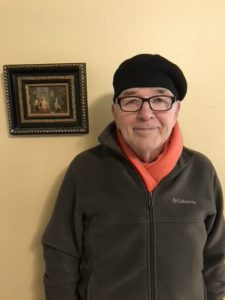
I am a retired psychiatric nurse living on a nature habitat near Newberg, Oregon. On my seventeenth birthday, I dropped out of school and joined the U.S. Army. I was stationed in Germany after training as a combat medic and paratrooper. After my discharge, I spent time aimlessly hitchhiking around the country with no special place to go. Later, I hitchhiked throughout Europe, across Africa, the middle east to India and Nepal. Eventually I became a merchant marine, making my home in Paris and the south of France when not at sea.
In 1969, I returned to the U.S., transporting military supplies and troops from San Francisco to Okinawa, Korea, and Japan. On one of my trips, I visited the famous garden of Ryoan-ji in Kyoto. That sparked a lifelong interest in Zen. I gave up sailing to become a student, majoring in Asian studies at San Francisco State where I discovered haiku and R.H. Blythe. There was a vibrant poetry and Zen scene at the time, and I was fortunate to be a work study student at the Poetry Center, epicenter of the San Francisco poetry scene. Through my work, I met most of the major American poets of that era. Meeting the poets and hearing them read their work gave me an interest in writing and poetry. At the same time, I was attending classes at Zen Center and taking classes in Buddhism at Berkely. I was fortunate to have met dynamic teachers like Paul Reps, Philip Whalen, and Alan Watts who were interested in the correlation between haiku and Zen. My wife and I moved to El Paso, after a couple years in Ohio.
I finished nursing school and obtained a graduate degree at the University of Texas in psychology. During this period, I started publishing short articles and stories for various magazines as a hobby. In 1988, We moved to Oregon and my interest in haiku spiked. I took classes in Japanese tea ceremony and became marginally involved with haiku enthusiasts in the Pacific Northwest. The area attracted serious haiku poets, people like Francine Porad, Michael Dylan Welch, Ce Rosenow, Sam Hamill, and Maggie Chula. I became friends with Lorraine Harr, pioneer editor of Dragonfly, one of the earlier haiku journals. She encouraged me to write little articles and haiku for small journals. I don’t remember all I published and many of those journals, Woodnotes, Northwest Literary Review, Sudden Showers, South by Southwest, Cherry Blossom Rain, others, no longer exist.
After a couple years, I started to lose interest and became disengaged from the scene. Five years ago, about 2020, I discovered Portland still had a haiku group, (Haiku Society of America). This talented, diverse group encouraged me to write haiku again. Also, about this time, I got hooked on flash fiction after taking a class with Anna Keesey. The new flexibility and possibilities combined with short prose stimulated me to write again. I don’t take my writing seriously; I think of it as a hobby. And I am constantly grateful to the staffs and editors of journals and websites such as Drifting Sands for keeping haiku alive and for providing a source of publishing. Recently, I assembled fifty of my currently published haibuns into book form. It is titled, Just Enough Moon, and is available from Amazon. I am always interested in contacts or information exchange with others who are interested in Japanese inspired haiku, haibun, and tanka. I may be contacted at
![]()